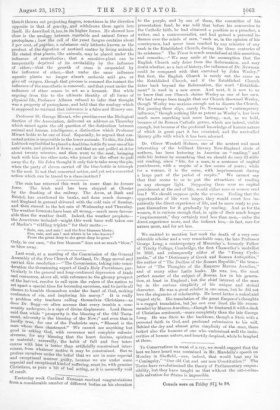Yesterday week Cardinal Newman received congratulations from a considerable number
of different bodies on his elevation
to the purple, and by one of them, the committee of his presentation fund, he was told that before his conversion to the Catholic faith, he had obtained a position as a preacher, a writer, and a controversialist, and had gained a personal in- fluence over the minds of men, " such as, in the opinion of his countrymen, had never been reached by any minister of any rank in the Established Church, during the three centuries of its existence." The Times is much scandalised at this assertion, and remarks,—" We may smile at the assumption that the English Church only dates from the Reformation, and may doubt whether, as a fact of history, the influence of Dr. Newman could be compared with that exercised by John Wesley." But first, the English Church is surely not the same as the Established Church, and if the Established Church dates back beyond the Reformation, the word "Establish- ment." is used in a new sense. And next, it is new to us to know that our Church claims Wesley as one of her own. We had always been taught that our Church disowned Wesley, though Wesley was anxious enough not to disown the Church. But passing these slips, surely Dr. Newman's " contemporary influence," though nothing like as potent as Wesley's, has been much more searching 'and more lasting,—not, as we hold, because .of its Roman Catholic germs, which are indeed, visible enough, but because of the profound knowledge of human nature of which in great part it has consisted, and the unrivalled literary gifts with which it has been adorned.






























 Previous page
Previous page